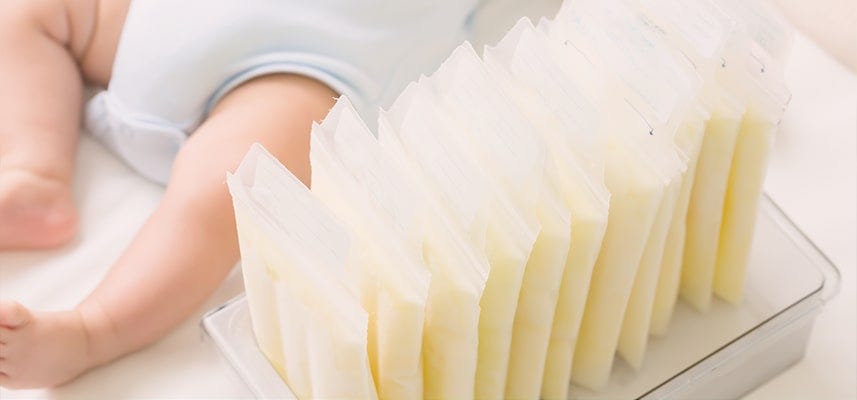Donor breast milk is human milk that is used as a substitute or supplement for a mother’s milk. Premature babies are the largest group of infants who receive donor milk, but donor human milk is increasingly used as a supplement for breastfeeding full-term babies in neonatal intensive care units (NICUs) and newborn nurseries.
However, donor milk is not limited to premature infants. In recent years, it has become more common for parents to consider using someone else's breast milk for various reasons, including milk sharing and breastfeeding an adopted baby.
In this guide, we will provide useful tips and information on using donor milk to feed your baby and address common questions about the process. Whether you are a new parent exploring feeding options, recently gave birth to a premature baby, or are considering breastfeeding your adopted baby, we will provide you with all the necessary information to make an informed decision.
Benefits of Using Donor Milk
The benefits of breastfeeding are undeniable, from developing a special closeness between mama and baby to regulating maternal heart rate, assisting in brain development, and more. But donor milk can be a lifesaver for those who can't produce enough milk to support their little ones.
Its benefits include:
- Enhanced Nutrition: Breast milk is considered the gold standard for infant nutrition, and donor milk can make it accessible for your baby in a situation where you cannot provide it yourself. It contains essential nutrients, antibodies, and enzymes that help boost the baby's immune system and support healthy growth and development.
- Reduced Risk of Infections: Milk from a screened and tested donor from a human milk bank is less likely to contain harmful bacteria or viruses compared to other feeding options. This reduces the risk of infections, especially for vulnerable premature or immunocompromised babies, while helping to bolster their developing immune systems.
- Digestive Benefits: Breast milk is easily digested by infants, leading to less digestive discomfort, such as colic or constipation. Donor milk has similar digestive benefits to a mother's milk, and it can also be easier on your little one’s digestive system when compared to infant formula.
- Emotional Bonding: Breastfeeding provides an opportunity for skin-to-skin contact and bonding between you and your baby, regardless of the biological relationship. This bonding experience can create a strong emotional connection between you two and promote a sense of security and comfort.
- Convenience: Donor milk can be a convenient option for premature or adoptive parents who may have difficulty producing enough milk or who are unable to breastfeed. It allows parents to provide their baby with the benefits of breast milk without the need for constant pumping or supplementation with formula.
Donor milk offers numerous benefits for both babies and parents in various situations. By exploring your options, you can ensure that your baby receives the benefits of breast milk even when breastfeeding yourself may not be possible.
Donor Milk FAQs
Donating breast milk is becoming increasingly popular, and we love to see it! In 2022, The Milk Bank reported 483,202 ounces of donated milk from over 1,000 donors, which fed nearly 1.5 million critically ill and premature infants that year. So know that if your baby needs donor milk, you are not alone. You are making the best choice for your little one’s health!
Here are some common questions we get from parents considering donor milk supplementation:
Why is donor milk preferred over formula supplements?
Donor milk can be life-saving for premature, small, and fragile babies, as it helps to prevent a very serious bowel condition called necrotizing enterocolitis (NEC). NEC is the most common cause of death in premature infants who are older than 2 weeks.
Preterm infants who receive mostly infant formula are at a much higher risk of NEC than those who are on 100% human breast milk diets. Before donor milk availability, many extremely premature babies in the U.S. developed and died from NEC every year. Thanks to the widespread use of donor milk, the rate of NEC in preemies has dropped to about 2-5% in recent years.
Is donor milk safe?
Most donor milk distributed in the U.S. comes from human milk banks or other nonprofit milk banks. The first priority for breastfeeding women who donate to milk banks is to go through a screening process, including blood tests, by their healthcare provider. They are tested for infectious diseases, including HIV, syphilis, and hepatitis B and C. They are also carefully screened to make sure they are not on any unsafe medications, do not use illegal drugs, and are in overall good health. Human breast milk donated to milk banks is pasteurized to kill off harmful bacteria and other organisms.
Donor milk used in NICUs is generally shelf-stable breast milk, which is sterilized before being distributed and given to babies. This sterilized milk is packaged and kept at room temperature. Like human milk bank donors, the mothers who donate their milk to entities that process shelf-stable milk are carefully screened for infections, health conditions, and medications and supplements that are not compatible with breastfeeding.
What about peer-to-peer or informal milk sharing?
Throughout history, babies have received breast milk from other women. Wet nurses were commonly used until the beginning of the 20th century when homemade infant formula became the substitute or supplement of choice for a mother’s breast milk.
Informal, or “peer-to-peer,” human milk sharing has gained popularity in recent years. We recommend that parents use caution in giving their babies pumped milk that has been donated by family members, friends, and acquaintances, and avoid purchasing donated milk that does not come from a human milk bank. Pumped milk can easily become contaminated if it is not stored correctly or when good hygiene is not used with milk collection. Moreover, previous studies have revealed that a significant percentage of breast milk for sale on the internet is adulterated with cow’s milk, which is not an appropriate source of nutrition for infants.
Premature babies and former preemies should only receive donor milk that comes from a human milk bank or a reputable distributor of shelf-stable milk due to the high risks of bacterial contamination and infection from breast milk that is informally shared.
Does donor milk have a different nutritional profile?
Research has shown that pasteurized donor human milk has lower levels of protein, antibodies, digestive enzymes, and “good” bacteria than birth mothers’ milk. Because of this, we typically advocate for mixing in some of the mother’s milk with every donor milk feed, if possible. Babies who receive a lot of donor milk in the NICU need to have their growth carefully monitored. Sometimes, you need to add extra fortification to this milk to provide additional calories, protein, and minerals for healthy bone growth.
Who supports the use of donor milk?
Most reputable medical resources support and encourage the use of donor milk when needed! These include the Centers for Disease Control & Prevention (CDC), Food & Drug Administration (FDA), National Institute of Health (NIH), American Academy of Pediatrics (AAP), World Health Organization (WHO), American College of Obstetricians and Gynecologists (ACOG), Surgeon General of the United States, Human Milk Banking Association of North America (HMBANA), National Association of Neonatal Nurses (NANN-AP), World Alliance for Breastfeeding Action (WABA), and more.
Combination Feeding Using Donor Milk in the NICU
Combination feeding with donor breast milk can be a beneficial option for new or adoptive mothers who want to provide their baby with the benefits of breast milk and breastfeeding but who may not have enough supply to entirely rely on their milk production alone.
We recommend that mothers of preemies in the NICU pump as much as they can so that their babies get all of the benefits of their milk. However, the reality is that it can be difficult to maintain a full milk supply if you are exclusively pumping and/or are separated from your baby for a long period of time. This is normal!
Combination feeding with donor breast milk is a great option for adoptive mothers who want to provide their baby with the benefits of breast milk but are struggling with milk production. Donated breast milk, whether in combination with your own or to fortify infant formula, can provide essential nutrients and antibodies that are beneficial for the baby's health and development.
Please know that it is okay if your baby needs to be supplemented with extra breast milk. As we’ve discussed, donor human milk is a safe option for your baby and has many benefits. Your milk will be given to your baby preferentially over donor milk, as well. Most babies can tolerate going back and forth between feeds of their mom’s milk and donor milk without a problem, and the two types of milk can also be safely combined into tube feeds or bottles.
It is important to discuss your options with your healthcare provider and a lactation consultant to determine the best feeding plan for you and your baby.
Becoming a Breast Milk Donor
Becoming a breast milk donor is a wonderful way to help other mothers and babies in need. If you have an abundant milk supply and are interested in donating, there are a few steps you can take to get started.
The first step in becoming a human milk donor is to contact your nearest milk bank to find out about breast milk donation. The Human Milk Banking Association of North America (HMBANA) has a comprehensive directory to help you find the milk bank that is closest to you.
It's important to find a reputable milk bank or organization that accepts breast milk donations. These facilities will have guidelines and protocols in place to ensure the safety and quality of the donated milk. Many hospitals and community organizations have programs for breast milk donation, so do some research to find a location near you.
Once you have found a milk bank or organization to donate to, you will likely need to undergo some screening procedures. This may include a health and lifestyle questionnaire, blood tests, and phone or in-person interviews. It's important to follow all of the guidelines provided by the milk bank to ensure that your milk is safe for other babies to consume.
Specific guidelines must be followed when expressing and storing breast milk for donation. Make sure to use clean, sterilized containers and label each container with the date and time the milk was expressed. It's also important to store the milk in a freezer that maintains a constant temperature.
Most donors are allowed to take prescription and over-the-counter (OTC) medications but are required to stop smoking, stop taking herbal supplements, and limit drinking. If you live far from your nearest bank, no worries! Some may ship coolers to your home for safe collection and transport of your milk and will cover all associated costs.
Not all milk collection banks compensate their donors, but we promise that the feeling of helping another mama is better than any payment. You are helping save a life!
Donating breast milk can be a rewarding experience, knowing that you are helping babies who may not have access to their mother's milk. If you have any questions or concerns about becoming a breast milk donor, don't hesitate to contact a lactation consultant or the organization you are donating to for guidance and support.
Because breastfeeding is a very personal and beautiful consideration for you and your new baby, know that you have options. Every mama wants the immune system of their little one to be strong, especially to help fight off any new virus strains that can appear year to year.
You are doing all the right things to educate yourself on feeding your baby breast milk! You have our support and encouragement. We hope this blog helps you identify your options and goals as you are ready to welcome your newest family member.
References
https://necsociety.org/nec-now/
https://www.ncbi.nlm.nih.gov/books/NBK513357/
https://www.ncbi.nlm.nih.gov/pmc/articles/PMC10102984/
https://www.cdc.gov/mmwr/volumes/71/wr/mm7133a1.htm
https://www.who.int/tools/elena/interventions/donormilk-infants
https://www.hmbana.org/how-to-help/donate-milk.html
https://nann.org/232-new-from-the-hill-to-the-nicu-out-now-provision-of-human-milk











